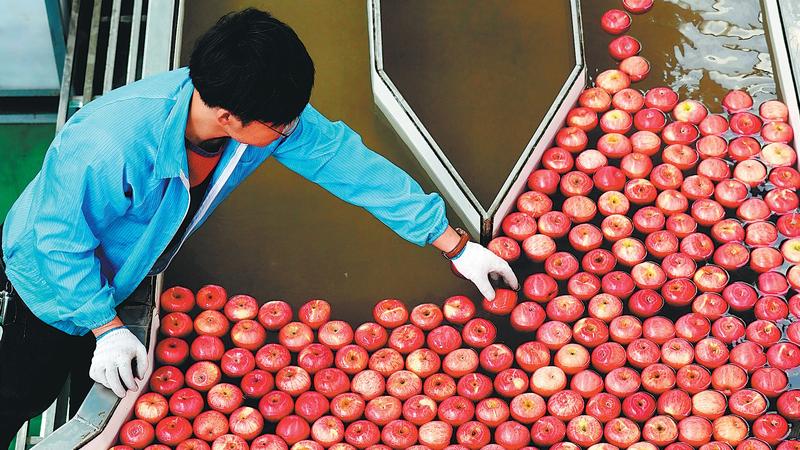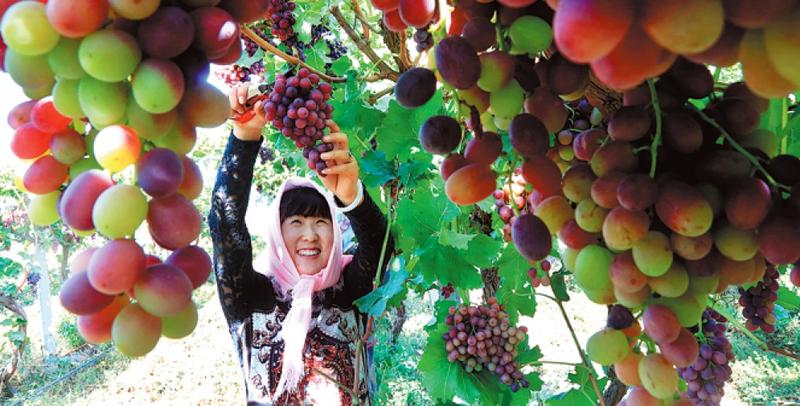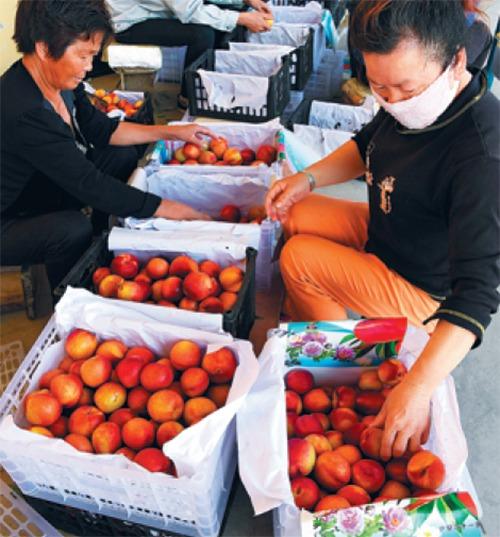
A worker sorts apples at a company in Luochuan, Shaanxi province. (Xinhua)
Dozens of trucks with Kazakhstan license plates line up as Chinese workers load them with tangerines, apples and other fruit and vegetables.
The next morning, this produce will appear in supermarkets before reaching dinner tables across Central Asia.
This is an everyday scene at Horgos Jinyi International Trade Co in Horgos, a border city in the Xinjiang Uygur autonomous region. More than half of Xinjiang's fruit and vegetables are exported via Horgos' port.
Yu Chengzhong, chairman of the company, which is the biggest agricultural products trading business in Xinjiang, said overseas demand for fruit and vegetables, especially in Central Asia and Europe, has grown rapidly in recent years, mainly due to the China-proposed Belt and Road Initiative.
In the first nine months of this year, the city's port handled 98,800 metric tons of fruit and vegetables worth 945 million yuan (US$136 million), an increase in volume of 50 percent and a rise in value of 70 percent year-on-year, according to Horgos Customs. Of this, 97,000 tons consisted of fruit, including grapes, apples and peaches.
Exports of various kinds of fruit in many provinces and cities in western areas of China have seen rapid growth in recent years due to trade opportunities triggered by the BRI.
Customs authorities in Gansu province said that in the first nine months of this year, fruit valued at 830 million yuan was exported, a year-on-year growth of 74 percent. The export value of apples rose by 65 per cent year on year.
Customs officials in the Guangxi Zhuang autonomous region said that in the first half of this year, the region exported 32,000 tons of tangerines and 18,000 tons of oranges, rises of 44 percent and 39 percent respectively year-on-year.
Exports of apple juice in Shaanxi province grew by 30 percent year-on-year in the first eight months. Last year, Shaanxi produced 11.54 million tons of apples, accounting for about one-seventh of global production, according to the provincial fruit administration.
Qu Qiang, a research fellow with the International Monetary Institute of Renmin University of China, said that for many years the country has made great efforts to support and benefit agriculture, rural areas and farmers.
Advanced agricultural technologies have spread to rural areas, including remote small villages. Compared with their peers worldwide, Chinese farmers count themselves among those with the most advanced agricultural technologies.
"China's agricultural technology is already advanced. There is widespread use of certified high-quality seeds, enabling farmers to produce large-scale fruit and cash crops," Qu said. "The quality of China's agricultural products is quite good, with some even better than those of developed countries."

Grapes are harvested in Ili, Xinjiang. (Xinhua)
CAREFUL APPROACH
However, due to a lack of sales channels, and fluctuating prices in domestic markets, farmers used to feel uncertain about prices every year, so they chose to adopt a careful approach and were reluctant to produce high volumes of fruit.
"The BRI has helped open additional global markets for farmers and companies in western parts of China, as many cities are now connected to countries and regions involved in the BRI," Qu said. "Moreover, trade facilitation measures have been made and more global trade platforms built to boost trade between these cities and overseas markets."
Qu added that fruit from China is in high demand among inland countries.
Also, Russia, which has significant demand for imported fruit and vegetables, has received 350 tons of red-centered kiwifruit from Liupanshui city, Guizhou province, in the past three months. This is also the first batch of this fruit to be exported from Liupanshui, a main production base for it.
Figures from the Department of Agriculture in Yunnan show that last year the province exported 742,000 tons of fruit worth US$1.61 billion. Under the BRI, exports of apples, peaches, pears and persimmon from Yunnan to South Asia and Southeast Asia have increased rapidly in recent years.
Gu Xueming, president of the Chinese Academy of International Trade and Economic Cooperation, part of the Ministry of Commerce, said the BRI has helped build many transportation channels for China to become connected to global markets, especially for cities in western areas of the country.
Since the launch of a rail route linking the southwestern city of Chongqing with Duisburg in Germany in 2011, many other Chinese cities have also opened routes that pass through different Asian and European countries.
By the end of June, more than 9,000 trains operating services for China Railway Express had passed through 48 cities in China and 42 others in 14 European countries. The rail network now covers all the main cities and regions in both continents.
By the end of last year, China had built more than 40,000 kilometers of passenger and freight trunk routes in collaboration with 70 ports in 11 countries. The nation also has direct flights with 43 countries taking part in the BRI, including those on 240 airlines launched after the initiative was proposed.
Dai Xiaoping, general manager of Huida Group, a lemon processing company in Chongqing's Tongnan district, said that before the BRI was proposed, no lemons had been exported from Tongnan.
After the proposal was made, many overseas buyers visited Chongqing to familiarize themselves with its lemon industry, and Huida was able to export its first batch of the fruit in 2016.
Last year, Huida sent a total of 60,000 tons of lemons and related products to more than 30 countries involved in the BRI, including Russia, Singapore and Indonesia.
"We tried to export before but failed, as overseas markets didn't know about our brands or recognize the quality of our products," Dai said. "The BRI has provided much policy support and has built up many platforms to help us reach overseas companies. It also strengthens these companies' trust in our products and service."

Workers package peaches in Tacheng, Xinjiang Uygur autonomous region for export to Tajikistan. (Xinhua)
LEGAL SUPPORT
Gu said China has also taken many measures to facilitate trade with global markets, such as simplifying administrative approval, speeding up inspection and quarantine procedures, and reducing the time taken to clear customs.
Since 2014, Chinese customs has signed 82 documents with countries and regions taking part in the BRI, including Russia, the European Union, Singapore and Laos, to specify legal support for multilateral trade.
Yu, the Horgos Jinyi chairman, said the BRI has greatly expanded the market for his business. He has been selling fruit and vegetables in Horgos for more than two decades, and said that since the initiative was proposed he has reached markets in Russia, Europe and West Asia.
"Previously, we had only a small volume of business in areas close to Horgos port," he said.
Moreover, it used to take two to three days for fruit and vegetables from Horgos to reach supermarkets in Central Asian countries. Now, the customs clearance procedure can be completed within two hours.
In Shaanxi, the main source of the country's apples, advanced agricultural technologies have been expanding. The province has built nine China-Kazakhstan Friendship Apple Orchards - under an agricultural cooperation program between the two countries - to facilitate exchanges of apple-growing technologies and experiences.
Guo Lanjun's orchard is one of these. It produced 4,000 to 5,000 kilograms of apples last year, of which about half were exported to countries such as Russia and Kazakhstan.
Due to the high quality of its products, the orchard has also become an education base offering training and guidance to overseas agricultural technicians, including how to manage apple orchards and how to prevent them being damaged by insects.
Tens of thousands of people, especially those from countries taking part in the BRI, have visited the Yangling Agricultural High-Tech Industries Demonstration Zone, 80 km from Xi'an, capital of Shaanxi, to learn about advanced agricultural technology.
Since 2005, more than 1,500 agricultural officials and technicians from 106 countries have been trained in the zone on various topics such as dryland agriculture, agricultural economics and green city construction.
Qu, from Renmin University, said that although overseas demand for the country's fruit products has grown rapidly, it is also important for Chinese companies to be aware of the risks arising from various factors, including differences in laws and regulations in destination countries, and fluctuations in exchange rates.
"For example, when Chinese companies export fruit, they need to be aware of the laws and regulations on pesticide residue limits, and produce the fruit accordingly. Otherwise, the excessive use of fertilizers or pesticides will cause them trouble and affect the reputation of Chinese fruit," he said.
While many provinces mainly export fresh fruit, Qu suggests that they should try to increase the added value of their products, including by additional processing of the fruit and cultivating wellknown local brands.

